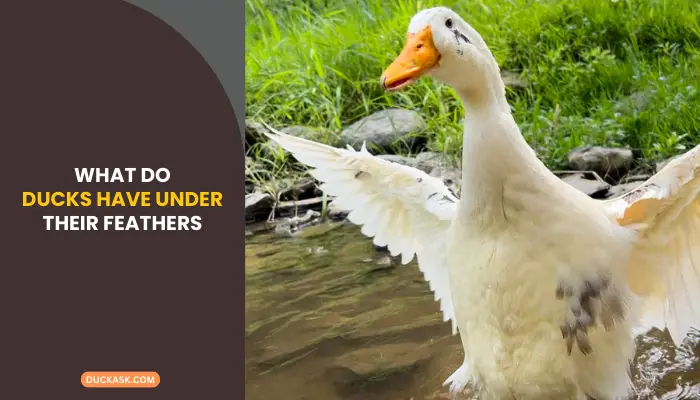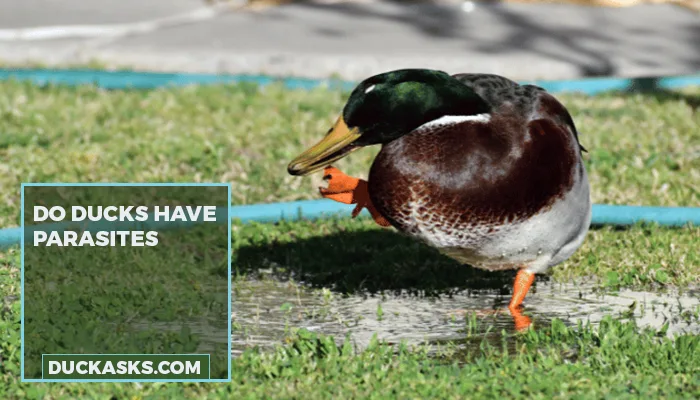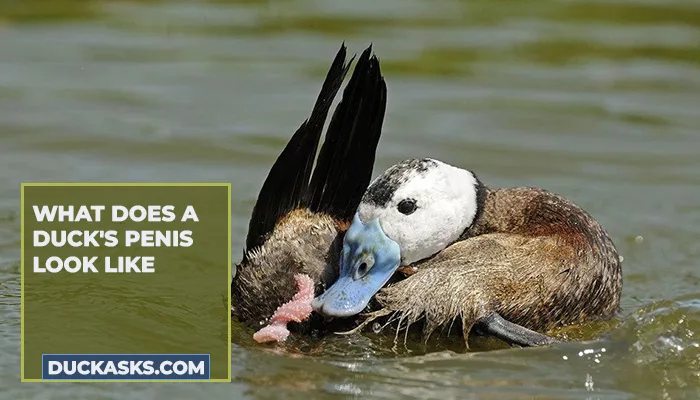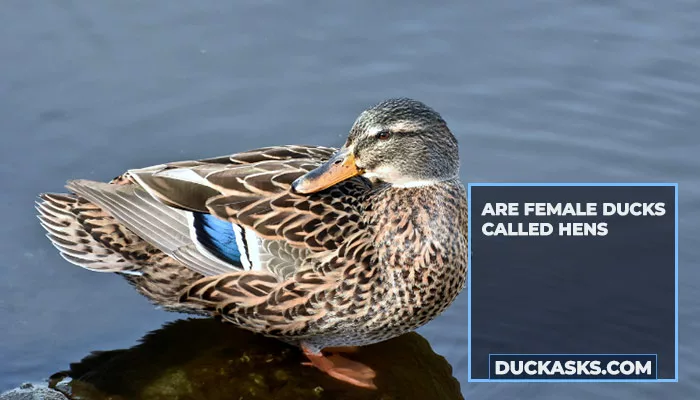What Is the Life Expectancy of a Duck?
Did you know that apart from raising ducks for meat and eggs, some people like to keep ducks as their pets? If you’re interested in bringing a cute little duck friend into your life, you may want to know first what is the life expectancy of a duck.
The average life expectancy of a duck is 5-10 years. But depending on various factors like safety, diet, shelter etc, ducks can have a lower or higher lifespan than average. Usually, ducks in captivity live longer than ducks in the wild.
If you can give your ducks a safe and ideal environment with a nutritious diet, you can expect them to live for even two decades and give you loving company for years.
What Is the Average Lifespan of a Wild Duck?
Due to living in high danger areas and with limited sources of food, wild ducks live for only about five to ten years on average. Being in the wild, they are often faced with starvation, diseases and deadly attacks from predators.
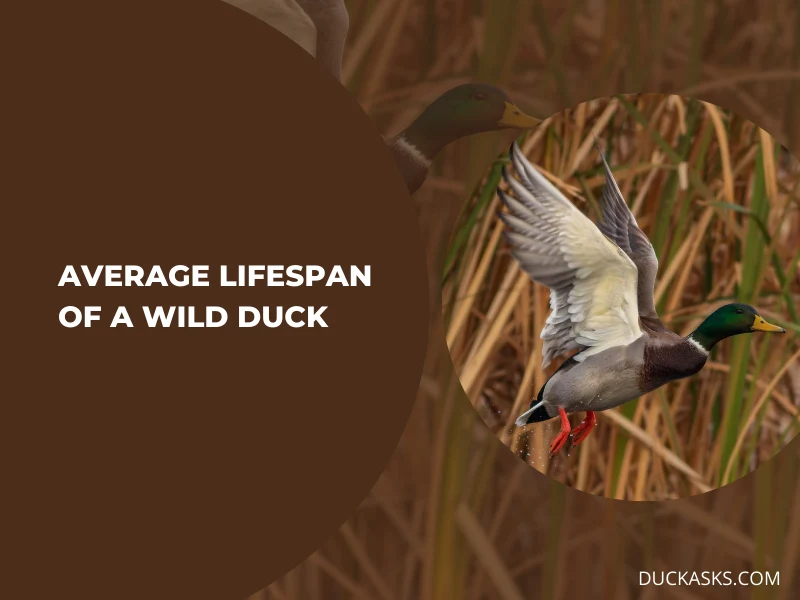
For wild ducks, the first year of their lives is the most danger-prone time. You’ll be surprised to know that only 10% of ducklings reach breeding age. But the good news is their clutch size is impressively big: 8-13 eggs at a single nesting attempt.
Though both their survival rate and clutch size can vary from species to species.
Reasons behind Their Short Life Expectancy
Even though wild ducks are more rugged than farm-grown ones, due to a couple of reasons, they have a relatively short life expectancy.
Predation
The biggest cause behind their early death is attacks from various predators from both land and hair. From big birds such as hawks and owls to land animals like foxes, coyotes, and skunks, many animals are great threats to ducklings and duck eggs.
Lack of Nutritious Food
Another reason behind such a short life span is that ducklings are often unable to provide themselves with the nutritious food that’s needed for their growth.
Eventually, they die of starvation or diseases without receiving any treatment.
The living conditions of wild ducks are quite harsh in nature and only a small number of them can live for a decade if they are lucky and can protect themselves from all the unending dangers.
What Is the Oldest Duck on Record?
According to the Guinness World Records, it was a pair of ducks who owned the record of being the oldest.
Astonishingly, they had lived for 49 years with their owner, Gladys Blackbeard, in South Africa until they died in 1966.
Are Ducks Able to Live Longer in Captivity?
While their counterparts fight for their lives in cruel nature, domesticated ducks are often pampered with various luxuries by their owners. As a result, ducks in captivity live almost one decade longer than wild ducks.

If they are provided with safe and nutritious food, the life expectancy of domesticated ducks can reach almost 20 years. But when they are raised only for meat, their lives are cut short at an early age of course.
Reasons Behind Their High Life Expectancy
Typically, farm-grown ducks get more care, treatment, and better feed. These are the reasons behind their high life expectancy compared to wild ones.
Safe Environment
Experienced duck owners usually take necessary steps to protect duck eggs and ducklings from predators. And thanks to the safe environment, they survive the crucial first year and reach adulthood without facing many risks.
Access to Nutritious Food
Domesticated ducks also don’t need to worry about foraging nutritious food for themselves. Their owners provide them with a well-balanced diet that meets all their needs.
Medical Treatment
Despite good food and a safe environment, when ducks in captivity fall sick, they receive medical attention from expert veterinarians. And luckily, they are often able to overcome the diseases and live a long life.
Many species of wild ducks die at a young age when under harsh and extreme weather. Domesticated ducks are also safe from storms, blizzards etc., as they live in well-built shelters.
How Can the Life Expectancy of a Duck Be Increased?
Well, happy people live longer and it’s the same with other animals as well. Ducks can also live a longer-than-average life when they are loved and well-cared for.
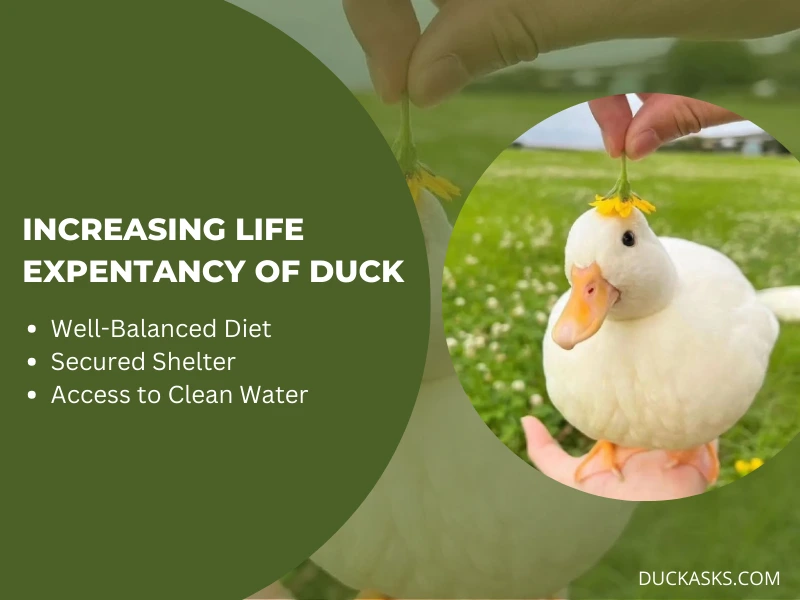
If you want to increase the life expectancy of your ducks, you should make sure you’re providing them with –
Well-Balanced Diet
The best foods that you can provide them with are similar types of foods that they usually eat in the wild. And that includes grains, vegetables and fruits.
For grains, you can go for rice, corn etc., whereas peas, zucchini, leafy greens can cover the portion of vegetables. Make sure to give them non-citrus fruit to keep them healthy. And worms can be a good source of protein if it’s available.
You can give them supplements and pellets to ensure they are not lacking any nutritional value from their regular diet. Especially when they are under three weeks of age, duck starter crumbles will be a great choice for them.
Secured Shelter
An arrangement of proper shelter for them is necessary for their well-being. But that doesn’t mean you have to go bankrupt in order to build houses for them. In fact, you can turn many things into duck shelters with a little modification.
For example, chicken coops, dog houses or any well-protected four walled rooms can be used as duck shelters. But you must ensure that it has a heavy door that will keep them safe from any predator looking for a chance to enter the room.
Another important factor to keep in mind is that their rooms must have ventilators. Do not leave them trapped in a small box in hot weather, as it can lead to death.
Access to Clean Water
If you plan to own ducks, you’re probably aware that they must have access to an adequate amount of water for their good health. Per day, one duck will need 1 liter of clean water.
The water is not only for their drinking but also for swimming everyday. Make sure they have a water pool deep enough for them to dip their whole body in. The unavailability of water can really negatively affect them mentally and physically.
If you notice anything unusual in your duck’s behavior, make sure to consult with a veterinarian as soon as possible. The earlier they receive treatment, the higher the chance they have of overcoming diseases.
What Is the Lifespan of Mallard Ducks?
Mallard is probably the most common duck breed in North America. Depending on the life condition, the life expectancy of mallard ducks in the wild and mallard ducks in captivity can have a huge difference. Have a look –
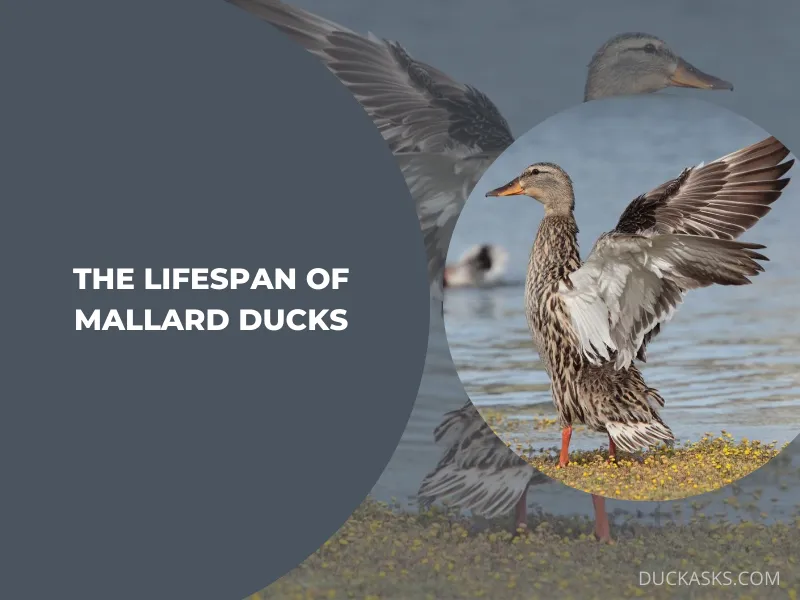
What Is the Lifespan of Mallard Duck in the Wild?
Unfortunately, Mallard ducks in the wild live for only around 2 years on average.
It’s because they often fall prey to predators and are a common target of hunters.
Harsh weather, poor nutrition, illnesses are also reasons behind their early death.
But if they somehow get lucky to live in a safe and ideal condition, they can live for around two decades, even in the wild.
What Is the Lifespan of Mallard Duck in Captivity?
Mallard ducks in captivity can live a much longer life if they are well taken care of. On average, they can live for 10 years if they are given protection from predators and nutritious food in a healthy environment.
Similar to Mallards in the wild, the ones in captivity can also live to be twenty in ideal circumstances.
Do Male or Female Ducks Live Longer?
Due to egg production, female ducks have a lower life expectancy than male ducks. Whereas drakes can sometimes live up to twenty years, female ducks only live up to 8 to 10 years.
Female ducks are also more prone to get attacked by predators as they stay behind to protect the ducklings than the drakes who leave. And in their old age, you’ll probably have to ensure more medical attention for female ducks than male ducks.
How Does the Life Expectancy of Different Duck Species Vary?
The life expectancy of different duck species varies due to many reasons. As we have already discussed the life expectancy of Mallards, below we mention the lifespans of a few more of the common duck species in North America.

Wood Duck
On average, wood ducks live for around three to five years. Only ten percent of ducklings survive the first two weeks because they are very common prey to predators. In very safe and ideal conditions, they might live to fifteen years.
Muscovy Duck
Muscovies are the goons in the world of ducks. Compared to other ducks, they are quite large in size. And they can usually defend themselves from predators using their wings and claws.
That’s why they are able to live for around five to eight years easily in the wild.
When they are in captivity, you can expect them to live for over a decade. In some cases, with an ideal environment, their lifespan can be even twenty years.
Eider
Unlike most other ducks, Eiders spend most of their time in water. Because of that, they are usually safe from predators. As a result, they can live to fourteen years even in the wild!
Their super-fast flying ability and heavyweight also help them protect themselves from many dangers and achieve one of the longest lifespans among ducks.
Which Duck Breed Lives the Longest?
There is no definite answer to which duck breed lives the longest. Some report that Pekin ducks live the longest, whose average lifespan is five to ten years. However, they can live to twenty years in many cases.
But Muscovies have also been reported to have an average lifespan of 8-12 years and can live for around two decades in ideal circumstances.
Conclusion
Due to being a common target of predators and hunters, the majority of ducks in the wild can’t even survive the first year after birth and the ones that reach maturity live for around a decade before they fall to diseases or lack nutritional food.
On the other hand, ducks in captivity, blessed with a much more secure and easy life, live a longer life. The less stress they have, the longer they live. This is a lesson that should be applied to humans too.
With proper nutrition and shelter, you can also increase the life expectancy of your ducks and give them a happy life.

